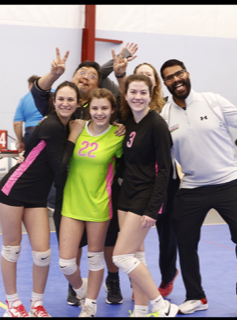Sport and Competition
Psyche of the Teenage Athlete
An exploration of coaches and mental health awareness.
Posted March 27, 2023 Reviewed by Davia Sills
Key points
- Coaches can impact an athlete's mental health. Cultivating an environment where athletes are loved and respected is vital.
- Being a coach is about relationships, growth, and the emotional journey of young athletes.
- Teenage athletes need to know it is OK to fail and that perfection is not the path to success.

Cultivating an environment where athletes feel loved and respected is vital. The years of creating an environment based on fear are no more. Fear should not be used to drive athletes to be better because not all athletes are wired to handle that. Most of the time, it is unproductive. Athletes then become rigid and mechanical and worry too much about making mistakes. They can often become frozen and fail to step up in situations that warrant tenacity.
Coaches can still be tough, but they also need to show care for their athletes. Teenage athletes are developing, and coaches must foster that development through encouragement and positivity. In my years of observing coach and player relationships, there is nothing better than a coach who can be tough and build up their athletes. Failing to do so could rob players of the best years of their lives. Athletes participate in sports because they love it, motivation which can easily be lost by a coach who does not promote a positive and caring environment.
It is not easy being a teenager and handling all the changes they experience as they “come into their own.” The stresses of everyday life can affect them significantly, both on and off their playing environments. Many athletes I work with worry about family issues, making decisions, academic pressures, feeling depressed, loss of confidence, and, most of all, what others think of them. These pressures can lead to high anxiety. For athletes who may have a hormonal imbalance or something psychiatric going on, it no longer becomes "just about the game."
"It cannot be forgotten that multiple factors affect mental health. The more risk factors adolescents are exposed to, the greater the potential impact on their mental health.”
With mental health awareness at the forefront, coaches today should focus on the best practices to work with their athletes. How will they coach in order to get the best out of their athletes in sports and life? What role can a coach play in keeping their athletes mentally healthy? So, the question is how to help the psyche of the teenage athlete.
We as a community need to take heed of this. Sometimes coaches place a lot of pressure on their athletes. Coaches often do not realize they can be the most important person to that athlete. As a coach, they are instrumental in developing the young people with whom they work. It's essential that coaches remember to speak of young athletes' strengths and not their limitations.
Coaches also need to realize how much weight their words hold. Some coaches limit their players, put them down, and tell them what they are and will never be. Choosing to be anything but positive and inspiring should not be an option.
What a coach can say today can be carried deep within an athlete’s subconscious for years to come. Understanding how much power they can have over their players is imperative. They should not abuse that power, but I, unfortunately, continue to see it. It is critical that coaches understand their role when working with their athletes and not stifle them as people or players. Many coaches have their view of what type of player their athlete is and what they are not. Coaches need to recognize that their presentation is everything and that their anxious energy transfers to their players during competition.
Coaches Need to Ask Themselves:
- Am I the kind of coach my athletes would run through the fire for? Or the coach that they want to throw into the fire?
- And if so, you have some reflection to do. Ask yourself, “Why do I coach?”
- Evaluate whether coaching is still a passion for you, or if you are going through the motions now. Are your players and teams progressing or not?
When an athlete makes a mistake, there is no more prominent critic than the one within them. Athletes who have bad games do not wake up that morning and say, “I want to perform poorly today.” When a coach or parent yells at them for their mistake, they are already upset. When my athletes miss a shot or make a mistake, I tell them to ask themselves, “What happened? What can I do better next time?” Promote thought for growth.
Oftentimes, coaches will focus on the negatives. Instead, a more productive and positive approach would be to just tell them to focus on the next play and move forward. Athletes need to feel that their coaches believe in them. It is OK to let them know what they did wrong, but it is equally important to let them know you believe in them. Everything is a growing experience. Even professional athletes constantly grow and evolve their game. Teenage athletes need to know it is OK to fail. Perfection is not the path to success.
There are essential aspects of growing a positive mindset and creating a Teflon psyche. The art of deflection is self-preservation for the teenage athlete. Sometimes, a parent, teacher, or coach comments negatively, and the young athlete must learn to deflect. They should ask themself the question, "Did that comment benefit me? Was there a teachable moment from that comment?" If they feel that they cannot benefit from what was said, as a sport psychology coach, I teach them to flush it, leave it there, and move on.
Consider the lesson, and throw away what could be potentially harmful to their psyche. We all have defensive mechanisms, and this is one of them. So, many mental strategies that I present to my athletes are to protect their psychological balance.
How can you help your athlete?
First, remember what it was like when you were young and perhaps an athlete yourself. Think about what you went through. Are you being the coach you would like to be if you were coaching your own children?
Being a coach is about relationships, growth, and the emotional journey of young athletes. Coaches that have coached for many years often lose sight of this. Some coaches need to dig deep within themselves and see if their team chemistry is a manifestation of the negativity that breeds within them.
Coaches need to recognize if they are projecting their own unhappiness onto their players. Sometimes it can happen at a subconscious level. As a coach, ask yourself: Do my players know I care about them outside of sports? If the answer is no, there is work to be done, or it's time to step down for the coach who can be tough, care for and love their players.
Teenage athletes need guidance, love, and a hard coach. Lessons can be learned without being an athlete’s friend, but by being the person they can rely on even when they have made a mistake. As a coach, you set the stage for how teenagers learn to deal with many of life’s challenges. It's so sad if a coach at the end of their tenure does not have a legacy of players that miss and respect them, much like Pat Summit or John Wooden.




